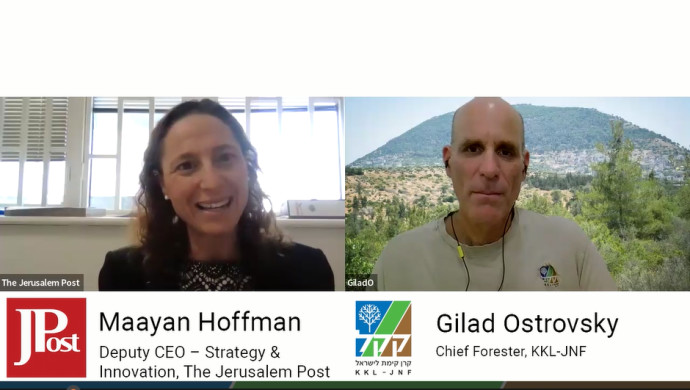WATCH: 'This is how the Israel-Hamas war is impacting the environment'
KKL-JNF Chief Forester Gilad Ostrovsky discusses how the war has impacted Israel’s forests.
In a one-on-one interview with Maayan Hoffman, Deputy CEO - Strategy & Innovation for the Jerusalem Post, Gilad Ostrovsky, Chief Forester for Keren Kayemeth LeIsrael-Jewish National Fund (KKL-JNF), discusses the impact that the Hamas-Israel war has had on the environment, and what KKL-JNF is doing to minimize the damages caused by the war.
“The most severe damage has been caused in the southwest part of the Negev, and the upper Galilee,” says Ostrovsky, who explains that damages were caused by fires and the movement of troops, heavy trucks, and tanks.
While repairing infrastructure can be done relatively quickly, restoring the vegetation, says Ostrovsky, is a long-term process. “We want to see if the trees can regenerate by themselves,” he says. “We usually wait for one winter to pass to see how they react to the fire and the damage to the broken trees. Then we survey each species and look at what we have, what damages have occurred, and we wait a few years to replant. We prefer to let natural processes occur to bring back the forest if possible. – so there are immediate actions and some long-term actions.” Ostrovsky estimates that it will take a year to rebuild damaged infrastructure, but the time it will take to restore the vegetation depends on the severity of the damage.
Another challenge that has presented itself in the restoration of the forests during the war is the fact that a number of KKL-JNF foresters have been serving in the IDF, thereby reducing the number of foresters available. Nevertheless, he says, “We know we have a lot of work, but we think that we can handle it.”
Ostrovsky adds that Israelis appreciate the open spaces and tranquility provided by the forests during these difficult times, just as they were valued during Corona. One of the main goals of KKL-JNF, he notes, is keeping the forest clean and well-maintained and ensuring that Israel’s forest areas remain large enough in the face of continued development within the country.
Another significant issue in forestry today is climate change. Ostrovsky says that KKL-JNF has recently completed a policy paper to prepare the forests for climate change and ensure the survival of trees and vegetation. “Our policy guidelines are primarily about preventing fires, keeping the forest healthy, and making it more resilient in dealing with severe conditions.”


